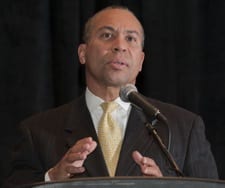Who is a member?
Our members are the local governments of Massachusetts and their elected and appointed leadership.
 Gov. Deval Patrick chose the opening session of the 2011 MMA Annual Meeting on Jan. 21 to unveil his proposal to address soaring municipal health insurance costs.
Gov. Deval Patrick chose the opening session of the 2011 MMA Annual Meeting on Jan. 21 to unveil his proposal to address soaring municipal health insurance costs.
Under the governor’s plan, all municipalities would be required to offer health plans that are of “comparable actuarial value” to the state’s Group Insurance Commission, or to join the GIC.
If a municipality’s health insurance does not meet the comparable actuarial value test, then the municipality would be required to enter into coalition bargaining with its municipal employees – for a limited time period – to reach agreement on how to comply.
Under the governor’s bill, his administration would write regulations to define “comparable actuarial value,” determine deadlines for negotiations, determine which option would be selected in the event that the parties cannot come to an agreement, and determine how much of the savings communities must share with municipal employees.
In a letter to legislators attached to his bill, the governor urged the Legislature to act quickly so that the new law could be in place and implemented by July 1.
Also at the MMA Annual Meeting, Rep. Charles Murphy, who was then chair of the House Ways and Means Committee, said he’s optimistic that the Legislature will address municipal health insurance this year.
He added, however, “Whatever we get done, you’re not going to love it, and the unions aren’t going to love it. But what are you going to do? We have to do the best we can to resolve this issue.”
During the MMA’s Annual Business Meeting on Jan. 22, municipal leaders unanimously endorsed legislation that would give cities and towns control over the design of health insurance plans outside of collective bargaining. The policy statement adopted by MMA members calls the legislation the most effective guarantee of real reform and taxpayer savings.
From the local perspective, the efficacy of the governor’s approach is dependent on the regulations that would be written after the bill’s passage.
Local officials and the MMA are encouraged that the issue of health insurance plan design is a priority for the Legislature and are grateful to the governor and the House speaker for calling for quick action.
Lawmakers had serious discussions about municipal health insurance last year, but they were not able to agree on a plan to help cities and towns control costs.
The governor’s bill would also require all municipalities to have eligible retired employees enrolled in Medicare as their primary source of health insurance coverage, a move that many cities and towns have already made.